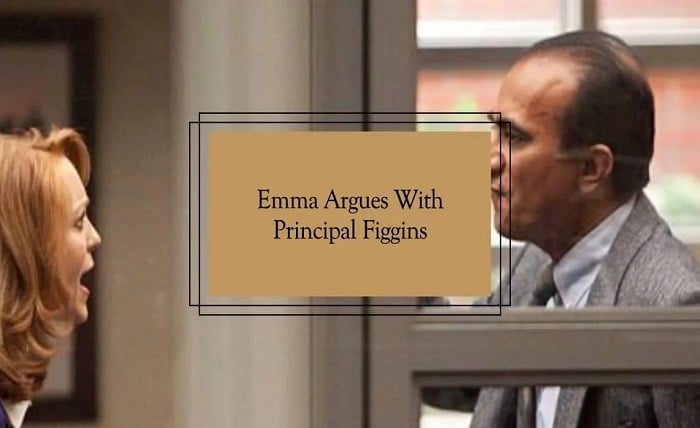The Passion and the Principal: The Iconic Clashes of Emma and Figgins

The halls of William McKinley High School echo with the melodies of teenage dreams and the rhythmic beat of glee clubs. But amidst the musicality, there’s a clash of wills that transcends catchy hooks and choreographed dance numbers. It’s the battle between passionate teacher Emma Pillsbury and the beleaguered Principal Figgins, a dynamic that fueled some of Glee’s most iconic and thought-provoking moments.
This isn’t your typical student-teacher conflict. Emma and Figgins represent two sides of the educational coin: the idealist yearning for growth and the pragmatist burdened by responsibility. Their arguments aren’t mere catty exchanges; they’re windows into the complexities of running a school, balancing individual potential with institutional limitations, and navigating the messy terrain of adolescence.
Figgins vs. Freedom: Fighting for the Glee Club’s Soul
One of the most enduring themes in Emma’s clashes with Figgins is the fight for creative freedom. Emma champions the Glee Club, a beacon of self-expression in a rigid system. Figgins, however, sees their unconventional methods and questionable song choices as threats to order and academic focus.
Their clash in “Journey to Regionals” perfectly encapsulates this conflict. After the Glee Club’s disappointing performance, Figgins, citing budget cuts and disciplinary issues, threatens to disband them. Emma, emboldened by the students’ love for the club, passionately argues for their intrinsic value, pleading for Figgins to recognize the joy and growth the club fosters. This argument isn’t just about karaoke; it’s about the right to dream, explore, and find solace in artistic expression.
Defying the Bureaucracy: Challenging the System From Within
Emma isn’t one to bow down to bureaucratic hurdles. When she believes in something, she tackles procedural roadblocks with unflinching determination. This often puts her at odds with Figgins, who embodies the school’s established rules and regulations.
In “Saturday Night Glee Fever,” Emma, frustrated by the Glee Club’s limited rehearsal time, proposes holding Saturday sessions. Figgins, citing union rules and budget constraints, flatly denies her request. Emma, however, rallies the students and teachers, organizing a grassroots fundraising effort and presenting Figgins with a well-organized proposal. While their interaction still holds tension, it’s a testament to Emma’s ability to work within the system while gently pushing its boundaries.
Beyond the Blackmail: Compassion in the Face of Authority
Despite their frequent disagreements, Emma and Figgins are not one-dimensional caricatures. There are moments where unexpected glimpses of humanity and compassion bridge the gap between their opposing positions.
In “The Substitute,” when Figgins’ insecurities are exploited by substitute Sue Sylvester, Emma steps in to defend him. She recognizes his vulnerability and, despite their past clashes, offers sincere support. This scene reminds us that even amidst conflict, empathy and understanding can exist.
When Figgins Becomes the Voice of Reason: Morality Redefined
While Emma often represents the idealistic perspective, there are instances where Figgins raises valid concerns about the Glee Club’s activities. In “Funeral,” when the club’s tribute performance disrupts Principal Chang’s memorial service, it’s Figgins who voices doubts about their methods.
He asks Emma to consider the consequences of their actions, reminding her that respect for authority and sensitivity to others are also valuable lessons. This nuance challenges the simplistic hero-villain dynamic, forcing us to consider the gray areas within educational conflicts.
Lessons Beyond the Auditorium: The Legacy of Emma and Figgins
The arguments between Emma and Figgins transcend the confines of McKinley High. They offer valuable lessons that resonate beyond the realm of high school musicals.
Finding Common Ground: Building Bridges for Progress
Despite their differences, Emma and Figgins eventually learn to navigate their contrasting viewpoints. They discover that progress can be achieved through understanding each other’s perspectives and finding common ground. This collaboration culminates in their joint efforts to save the Glee Club in “Goodbye, Sue Sylvester,” showcasing the power of cooperation in achieving shared goals.
Conclusion
The fiery clashes between Emma Pillsbury and Principal Figgins are more than just entertaining moments in Glee’s narrative. They are a reflection of the complex realities of navigating the educational landscape, balancing the needs of individuals with the constraints of institutions. Their arguments challenge us to consider the importance of artistic freedom, responsible authority, and finding common ground amidst differing perspectives.
As the curtain falls on McKinley High, we’re left with a melody of lessons that resonate beyond the auditorium. We learn that progress demands both passionate advocacy and measured pragmatism. We understand that empathy and understanding can bridge the gap even when viewpoints collide. And most importantly, we realize that the pursuit of dreams, like a perfectly harmonized song, requires the voices of diverse individuals rising together in triumphant synergy.
FAQ
- Who “won” the most arguments between Emma and Figgins?
Neither truly “wins” in the traditional sense. Their arguments spark growth and change, highlighting the value of diverse perspectives in tackling complex issues.
- Did their constant arguing negatively impact the Glee Club?
While their clashes initially caused friction, their eventual understanding and collaboration ultimately benefited the club, allowing them to navigate challenges while preserving their creative spirit.
- Are Emma and Figgins meant to represent specific educational philosophies?
While they embody certain aspects of different approaches, they should not be seen as rigid caricatures. Their complexity reflects the multifaceted nature of educational leadership.
- What is the most important lesson we can learn from their confrontations?
The importance of open communication, mutual respect, and finding common ground even when faced with differing viewpoints. These are valuable lessons not just for educators and students, but for anyone navigating the complexities of human interaction.
- Do Emma and Figgins ever become friends?
While their relationship remains professional, they develop a mutual respect and understanding through their shared experiences. They recognize each other’s strengths and appreciate their contributions to the school, hinting at a fragile foundation for potential friendship.




